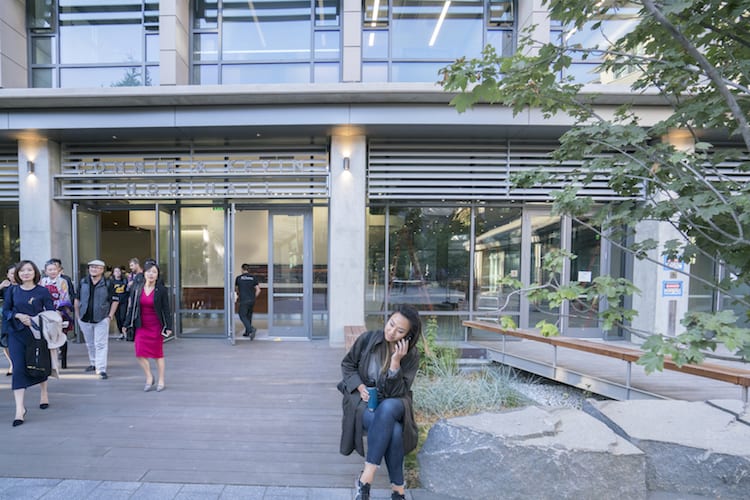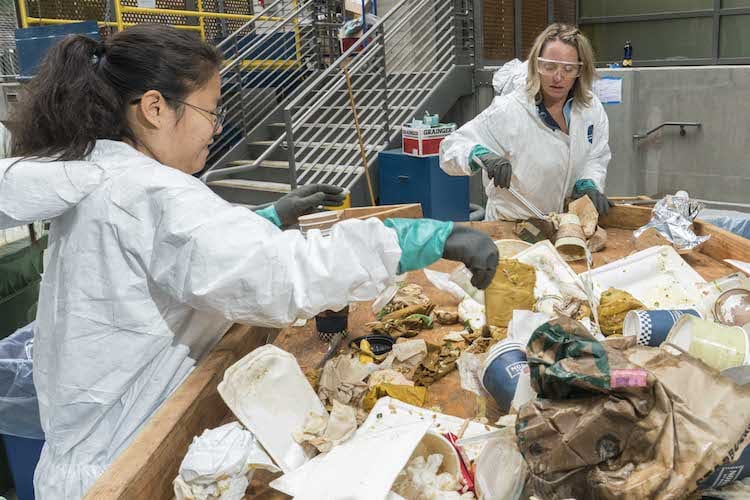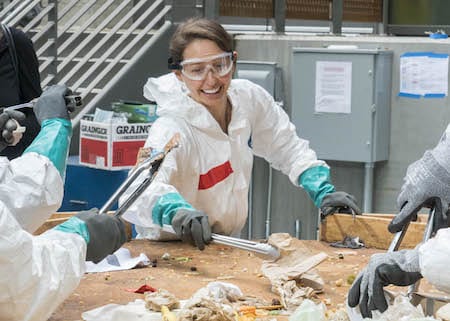 Chou Hall is officially the country’s greenest academic building, having earned TRUE Zero Waste certification at the highest possible level along with a LEED Platinum certification for its energy efficient design and operation.
Chou Hall is officially the country’s greenest academic building, having earned TRUE Zero Waste certification at the highest possible level along with a LEED Platinum certification for its energy efficient design and operation.
The TRUE Platinum Zero Waste certification came after more than a year of dedicated waste sorting, composting, and other efforts to divert over 90 percent of Chou’s landfill waste. The official notice came from Green Business Certification Inc. (GBSI) on Dec. 20, following an on-site audit by the U.S. Green Building Council.
“The whole team is beyond excited to lead the way with the country’s greenest academic building,” said Danner Doud-Martin, the staff lead of the Haas Zero Waste Initiative and associate director of the International Business Development (IBD) Program at Haas. “It’s been such a journey—more than two years of trying to get all of our stakeholders on board with behavioral changes. It’s been a significant challenge, but we are so proud of all that we’ve accomplished.”
“A mark of leadership”
The Chou Hall Zero Waste Initiative is a joint effort led by a multidisciplinary team of graduate and undergraduate students working closely with Cal Zero Waste, Haas faculty and staff, facilities management, and building vendors to ensure that building operations are designed for successful waste diversion.
“Zero waste is a culture change for organizations and we’re thrilled to see that Berkeley Haas students, faculty, and staff have wholeheartedly committed to it,” said Stephanie Barger, director of TRUE at the U.S. Green Business Council. “TRUE certification is a mark of leadership and ongoing commitment to advancing a zero-waste economy.” About 25 percent of the more than 100 TRUE-certified facilities have achieved TRUE Platinum, Barger said. Chou Hall is the only academic building to achieve the honor.

During their December visit, the final step toward certification, the Green Building Council interviewed stakeholders involved with the project—including Courtney Chandler, Haas chief strategy and operating officer, former Haas COO Jo Mackness, and Haas Management Lecturer Frank Schultz, among others.
Separately, GBCI also announced this month that Chou received LEED Platinum certification for its architectural design, construction, and functioning of the building, earning 85 points—well above the 80 points required for the Platinum rating. Points are allotted in areas such as water efficiency, energy use, construction materials used, indoor environmental quality, and design innovation. Haas is also pursuing a third designation, WELL certification, given to buildings that promote user health and well-being.
“Going for all three certifications at the highest level is incredibly ambitious,” Chandler said. “With WELL certification we hope to achieve a trifecta. We are so proud of the work that everyone has done to make Chou Hall the greenest academic building in the country, and we hope that our work will inspire and guide all of the UC campuses and other institutions across the country.”
“A wonderful confirmation”
TRUE Zero Waste certification levels include Certified, Silver, Gold, and Platinum. To achieve TRUE Platinum, the Chou team earned 69 out of the 70 credits that they applied for, providing a narrative and evidence for each credit. Credits included everything from composting food scraps to tracking the purchase of environmentally preferred products to providing employees with access to zero-waste training to reducing the use of hazardous waste chemicals.

Jessica Heiges, the Chou Hall Zero Waste Initiative student lead and a candidate for the Master’s of Development Practice program at the College of Natural Resources, called the certification “a wonderful confirmation that the enormous amount of hours that the community devoted toward the effort was finally validated.”
“This was a very difficult initiative because we are the first ones to go through it,” she said. “There were no best practices, no industry trends that we could fall back on or implement with our eyes closed. We had to address every single credit and the underlying motivation behind each credit, and had to go through it in a much more meticulous manner because it was all brand new.”
With the certification earned, Doud-Martin said the committee will now draft a “best practices” manual as a guide for other UC campus buildings that want to follow in Haas’ footsteps. Heiges said she’s excited to meet with other groups on campus to share what they’ve learned.
A shift toward reusing and reducing
The zero waste certification process began as soon as Connie & Kevin Chou Hall opened to students in August 2017.
“We initiated the TRUE Zero Waste certification for Chou Hall as our beacon to demonstrate that zero waste is definitely achievable for the entire campus,” said Lin King, manager of Cal Zero Waste, which manages waste for all of campus and is aligned with the University of California’s commitment to move toward zero waste by 2020.
In August 2018, Haas participated in its third week-long TRUE Zero Waste audit. Waste audits—a messy, hands-on endeavor that requires separating compostable items like soiled paper towels and paper cups from recyclable cans and bottles. The audits are a required component to better understand the waste flow and provide a benchmark for improvement.
The team used audit data to make more zero-waste adjustments and recommendations, including working with Café Think and the Evening & Weekend MBA program to change student snack offerings to bulk items; implementing a program to donate Café Think’s coffee grounds to UC Berkeley’s Gill Tract Farm for garden compost, and replacing the bathrooms’ one-roll toilet paper dispensers with two-roll dispensers to conserve toilet paper. (Custodial staff are less likely to toss an almost-spent roll if there’s a second one in the dispenser, Doud-Martin said.)
Doud-Martin said the next phase will be to encourage a shift from recycling and composting toward reusing or reducing single-use items such as “to go” containers and coffee cups. One recent example is a pilot with Café Think, which allowed customers to put down a $1 deposit for a mason jar of overnight oats and yogurt that can be refilled at the cafe. “Our goals are mighty,” she said. “But this shift would align us with more of a true zero-waste model.”